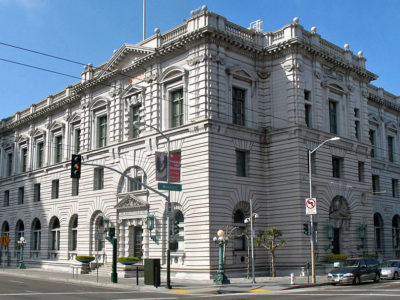 Yesterday, the Ninth Circuit ruled in favor of the plaintiffs in two climate change cases brought against the oil industry. The court ruled on a narrow but important procedural issue: whether the cases should be sent back to state court. Cities and counties should now be able to continue with the cases, in which they …
Yesterday, the Ninth Circuit ruled in favor of the plaintiffs in two climate change cases brought against the oil industry. The court ruled on a narrow but important procedural issue: whether the cases should be sent back to state court. Cities and counties should now be able to continue with the cases, in which they …
Continue reading "Suing Big Oil"
The post Suing Big Oil appeared first on Legal Planet.
#bigoil #theplaintiffs
Yesterday, the Ninth Circuit ruled in favor of the plaintiffs in two climate change cases brought against the oil industry. The court ruled on a narrow but important procedural issue: whether the cases should be sent back to state court. Cities and counties should now be able to continue with the cases, in which they want the industry to reimburse them for expenses relating to climate change. Even in state courts, they will have a lot of barriers to overcome, but at least the plaintiffs will be in the forum they prefer.
The procedural issue is very technical but has great practical importance. State courts in places like California are much more favorable to climate plaintiffs than the federal courts, which are packed with Bush and Trump appointees. The plaintiffs filed their cases in state court for that reason. The defendant oil companies then attempted to move the cases to federal court. That’s when things got complicated.
The oil companies had two main theories for why the case had to be in federal court. Their first theory was based on a rule relating to officers of the federal government. A lawsuit against a federal officer can be moved to federal court because states might be biased against the officer. The Supreme Court has interpreted this law to include some government contractors who are tightly supervised by the federal government. (That seems like a stretch to me, but who am I to disagree with the Court?) The defendants claimed that some oil leases involving the Navy put oil companies into this category. The Ninth Circuit concluded that this exception wasn’t broad enough to include the oil leases in question. That seems right, unless every federal contractor is going to be covered by the exception.
The basis for the oil company’s second main argument is that a lawsuit can be moved to federal courts when federal law has wiped out the power of states to deal with a subject. The Supreme Court has held — and reaffirmed in a ruling in April — that this is a very limited basis for federal jurisdiction. It applies only only when federal law completely wipes out an area of state authority.
The oil companies argued that state law was wiped out by something called the “federal common law” because climate change inherently involves national and international issues. The oil companies then argued that the “federal common law” itself was wiped out by a federal statute, the Clean Air Act. So in the end, nothing is left standing but the Clean Air Act, which offers the plaintiffs no remedy.
According to this theory, the federal common law is only a hypothetical, since it’s actually eliminated by the Clean Air Act. But somehow this hypothetical body of common law, which doesn’t really exist, has enough of a ghostly reality to eliminate the state law remedy and pull the case into federal court.
The Ninth Circuit wasn’t buying this contrived argument. In the court’s view, the real question was whether the Clean Air Act itself sweepingly eliminated state remedies. The court concluded that the answer is no. In fact, the Clean Air Act itself says that state remedies are generally o.k.. In the context of the Clean Water Act, which has similar provisions, the Supreme Court has squarely rejected an argument similar to the oil industry’s — federal common law destroys state right to sue, statute destroys federal common law, so no right to sue.
Will the Supreme Court intervene? As a technical matter, the Ninth Circuit seems clearly correct. But even if these lawsuits ultimately lose in state court, such lawsuits could be a drain on oil companies and scare investors. The question is whether the Supreme Court is willing to wait until the state courts have finished deciding these cases.
At least some Justices on the Supreme Court are likely to think that these lawsuits are an invitation to dangerous judicial activism. And they may not trust the courts in Blue States to turn down the invitation. Are there enough Justices with that attitude to overturn the Ninth Circuit? I guess we’ll find out.
The post Suing Big Oil appeared first on Legal Planet.
By: Dan Farber
Title: Suing Big Oil
Sourced From: legal-planet.org/2020/05/27/suing-big-oil/
Published Date: Wed, 27 May 2020 13:38:30 +0000
Vist Maida on Social Me
Website Links
Maida Law Firm - Auto Accident Attorneys of Houston, by fuseology

No comments:
Post a Comment